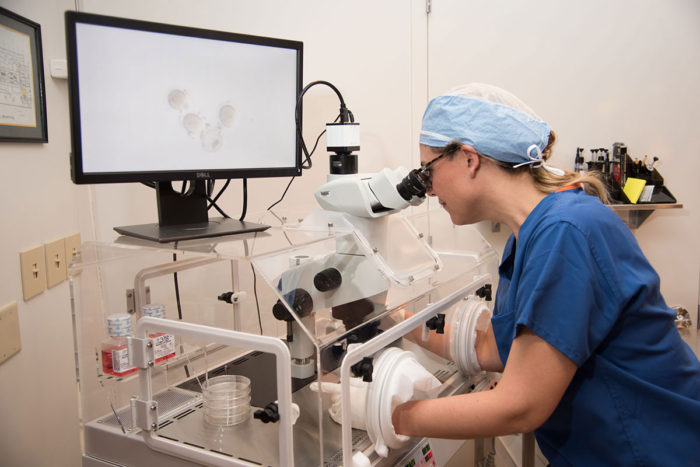Insurance coverage for IVF increases chance of having baby
Without coverage, many cannot afford multiple infertility treatments
 Robert Boston
Robert BostonEmily S. Jungheim, MD, an associate professor of obstetrics and gynecology at Washington University School of Medicine in St. Louis, examines oocytes retrieved during an in vitro fertilization (IVF) procedure. Jungheim treats patients at the university's Fertility and Reproductive Medicine Center.
Women who pursue in vitro fertilization (IVF) to become pregnant are more likely to give birth if they have health insurance that covers the procedure, according to new research at Washington University School of Medicine in St. Louis.
The key reason is financial rather than medical: For many people, the high cost for one IVF procedure prohibits women from seeking a second treatment if the first attempt fails.
The study is published March 28 in The Journal of the American Medical Association.
“It’s a simple and possibly obvious finding, but it highlights the importance of health insurance in the outcome of fertility treatments,” said lead author Emily S. Jungheim, MD, an associate professor of obstetrics and gynecology at the School of Medicine. “The biggest hurdle may not be the fertility treatment but the cost.”
The American Pregnancy Association estimates the cost of a single IVF treatment at $12,000 to $17,000. The success of one IVF procedure ranges from more than 40 percent for women under age 35 to about 15 percent for women over age 40. Besides age, success may vary due to lifestyle, cause of infertility and reproductive history, among other factors.
Jungheim’s study examined data from 1,572 women who sought IVF treatment from 2001 to 2010 at Washington University’s Fertility and Reproductive Medicine Center, which serves women in Missouri and Illinois. The clinic’s location is significant to the findings because Illinois mandates IVF coverage while Missouri does not.
Of the women included in the study, 875 (56 percent) had insurance for IVF and 697 (44 percent) paid for the procedure themselves. Those with insurance were slightly younger than those without. And the researchers found that 70 percent of women with insurance returned for a second IVF treatment if the initial treatment was unsuccessful.
Ultimately, for women with IVF coverage, the average likelihood of giving birth after up to four attempts was 59 percent, or 515 births. This compared with 51 percent, or 350 births, for women without such coverage — a difference that is statistically significant.
“The two groups were medically similar and had the same outcomes in individual cycles after controlling for factors such as age,” Jungheim said. “The difference is that women with coverage were more likely to come back and try again if they were initially unsuccessful. Given that they had the ability to try more times, they had a higher chance of giving birth.”
Nationwide, 15 states have infertility insurance laws, according to the American Society for Reproductive Medicine. However, Jungheim noted, only five states have comprehensive mandates for infertility that include IVF. Those states are Illinois, Massachusetts, Rhode Island, Connecticut and New Jersey.
Jungheim cited study limitations including that the data were obtained from a single fertility center and some of the women may have received additional IVF treatments at other clinics.
“However, these findings highlight the critical role insurance plays in determining whether a woman with fertility issues ultimately will have a baby,” Jungheim said. “Legislation mandating IVF insurance coverage may improve the delivery and outcomes of fertility treatments.”
Also contributing to the study were researchers from Washington University’s Olin Business School and the Brown School.







